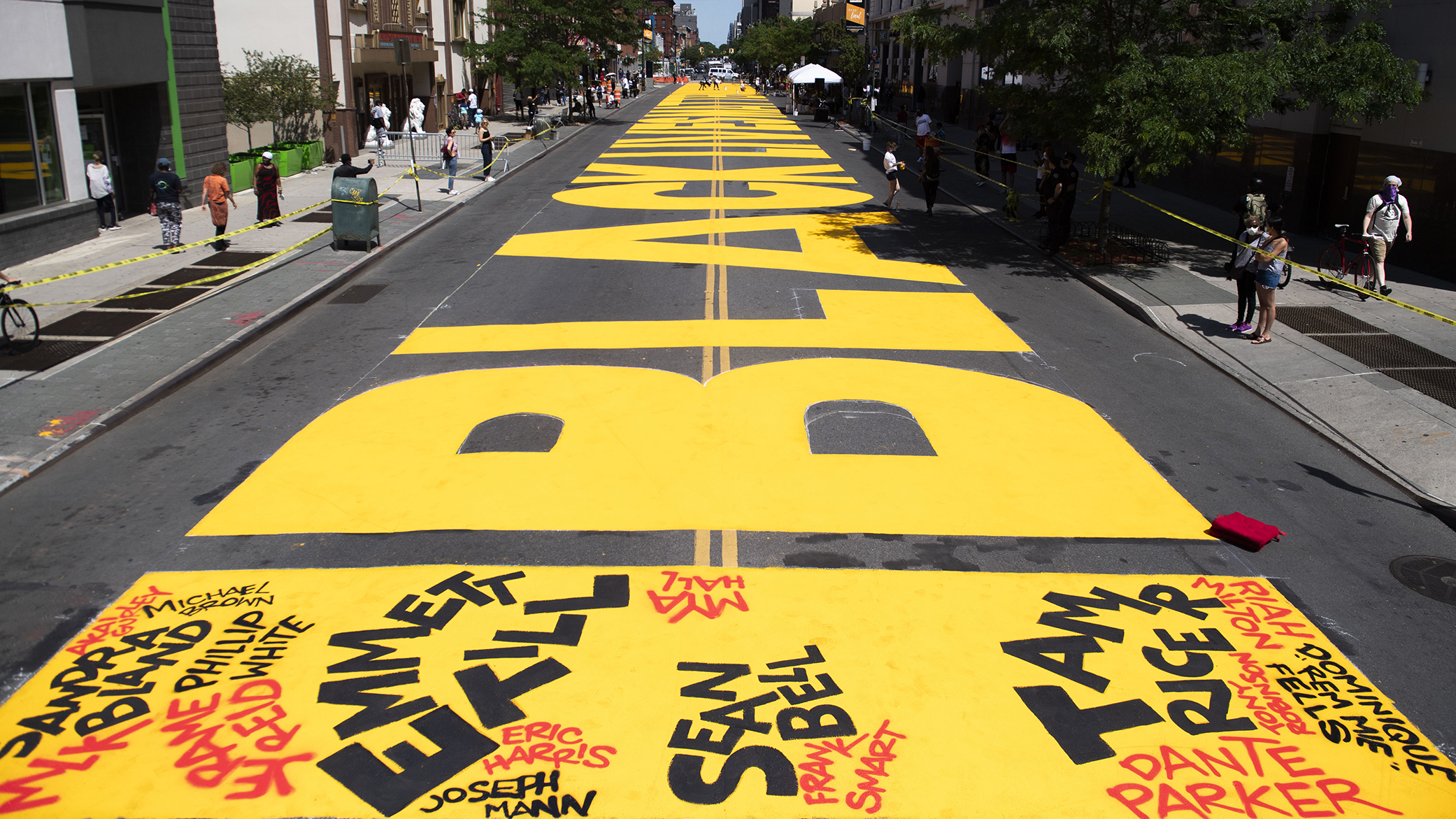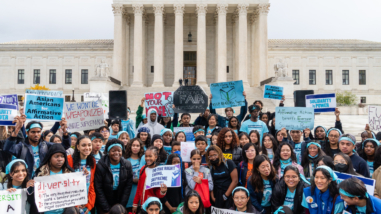New steps to address systemic racism

The killings of George Floyd, Ahmaud Arbery, Breonna Taylor, and so many others, spurred widespread protests and a broad awakening that, as a society, we have ignored the malign harms of systemic racism for far too long—a long overdue acknowledgment of experiences lived and endured daily within the Black community. The resulting imperative challenges all institutions, but especially institutions like ours, that have not confronted systemic racism directly, to step up and do so now.
In the initial days of the summer protests, we issued a statement expressing grief and condemning the racism underlying these deaths, and acknowledging that addressing systemic racism—which afflicts every field in which we work—requires more than a statement or one-time action. It demands, we said, “an ongoing commitment—steady, thoughtful, substantive, and honest.” Since late May, the staff of the Hewlett Foundation has been grappling with how we can make good on that commitment. This week, our board endorsed an initial set of actions we proposed to elevate the fight against racial injustice in our work: $18 million in funds this year dedicated to combating systemic racism, a new 10-year $150 million racial justice initiative, and intentional efforts to add a racial justice lens to our ongoing programs and operations.
These actions flowed from conversations I had, individually and in small groups, with practically everyone on our staff, as well as with key external peers and members of our board. Listening to their thoughts and feelings and hearing their ideas about how we might meet the moment was simultaneously rewarding, challenging, emotional, and deeply meaningful. The staff of the Hewlett Foundation is not monolithic. Fewer than half our staff today identifies as white, down from more than two-thirds that identified this way when I joined the foundation in 2012. The resulting range of experiences and viewpoints encompasses a variation of perception and understanding of systemic racism that highlights the important work we all need to undertake—including me—to build our capacity to identify, talk about, and address racial equity. As a community, we are committed to learning more about how systemic racism influences and affects the fields in which we work and bringing racial justice more fully into both our grantmaking and our culture.
New grantmaking to address systemic racism
A critical choice we have made is to increase the grant dollars we provide to organizations working on anti-racism, both in the immediate future and for the longer term. As a first step, this year we will provide $18 million to organizations working on systemic racism, and especially anti-Black racism. Many organizations doing this work that have struggled for years to find adequate funding will be able, especially in today’s extraordinary circumstances, to make catalytic use of such support. We are developing a process that draws on the expertise of staff across multiple departments and programs to help determine how best to allocate these funds.
We are, at the same time, making a larger, longer-term investment in the fight for racial justice. This week, our board approved the development of a new 10-year, $150 million racial justice initiative. There are, of course, myriad areas of opportunity and well-defined problems within the broad domain of racial justice where Hewlett’s outcome-focused philanthropy could help make a meaningful difference. We are launching a process, including seeking outside input, to identify and define a grantmaking strategy. The 10-year time frame provides us the opportunity to shape that strategy in a thoughtful manner, build our knowledge in this new area of work, and provide sustained support to nonprofits that are committed to addressing racism and advancing racial justice.
Ensuring racial equity in existing work
Beyond these new allocations of almost $170 million, we will also seek to more fully incorporate racial equity into our ongoing programs and grantmaking strategies. The thing about systemic racism is precisely that it is systemic—meaning it is operating, in some form or way, in all the fields in which we work: education, performing arts, environment, global governance, reproductive health, U.S. democracy and philanthropy itself. We cannot live up to the aspiration of our own first guiding principle—to bring about meaningful, socially beneficial, long-term change—unless and until we grapple with the pernicious effects of racism across all our work. Indeed, addressing racial equity is already at the heart of many of our grantmaking strategies. It is the core of our Performing Arts and Education programs. Shifting funding and power to groups led by, serving, and representing people of color has likewise become central to our work in Western conservation, U.S. reproductive rights, and effective philanthropy. Racial equity was at the heart of our decision to shift the Serving Bay Area Communities Program to focus on housing and to help launch the Climate and Clean Energy Equity Fund. And all of our programs have provided capacity-building grants to enable existing grantees to undertake their own work around diversity, equity, and inclusion.
Moving forward, I have asked each of our programs to investigate how systemic racism shows up in the context of our existing goals, and to look for ways we can address it in our grantmaking. This doesn’t mean setting aside those goals or abandoning longtime areas of work; rather it calls upon us to more intentionally consider where systemic racism affects these strategies, and to identify specific actions we can undertake to address it in furtherance of those goals. While some of our programs are already doing this work and will use this opportunity to sharpen it, others will be starting with fresh eyes.
Building a more equitable culture
Addressing systemic racism is not just about our grantmaking. Alongside so many other institutions, we believe the moment also calls for self-reflection and a focus on our own culture and operations. We have spent the past several years focusing broadly on improving the foundation’s DEI practices. Race has been a part of that work, but only one part because of the intent to keep our focus wide and inclusive. The simple truth is that race is different—harder and more fraught to grapple with because it so deeply entangled in quotidian practices and intimately connected to both individual identity and our nation’s history of slavery and injustice.
We need to strengthen our capacity to do so through an ongoing process of education, discussion, exploration, and relationship-building specific to racism. To this end, we are creating a new role for a Chief Equity and Culture Officer, reporting to me, who will bring a depth of expertise and experience working on matters of race in organizations. We will, in addition, provide one-on-one coaching to enable every staff member to build their individual capacity, alongside additional training and an educational series of internal talks and workshops specific to racism, and especially anti-Black racism. This is critical work for all of us, but especially for those of us in senior roles, who carry the responsibility and challenges of leading an organization right now. We have a responsibility to create a culture in which we learn from each other and honor the views and voices of everyone on our staff. These steps will, we hope, strengthen our internal operations and our ability to build external partnerships rooted in trust and mutual respect.
The known and disregarded truth has been that racism lives everywhere: that the legacy of slavery and Jim Crow and lynching and overtly and covertly racist policies at every level of government and in every sphere of life are systems and practices and institutions that no longer even need conscious effort to advance and perpetuate racial subordination. The racism is, literally, baked into the system, and in ways that extend from overt and obvious (as in police abuse), to embedded but clear (as in the structure of public education or the disparate impacts of COVID-19), to hidden subtleties coded into our language, dress, and expectations of “proper” behavior.
The “business as usual” that has permitted this all to persist must end. As a foundation that has not traditionally focused on racial justice, we undertake this work with intentionality tempered by humility. We know we have hard work ahead and much still to learn—from each other, from our peers and partners, and from those whose lived experience is different from ours. While our efforts will evolve as our experience deepens, we are committed to stepping up to help build a more equitable and inclusive society.



